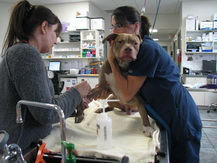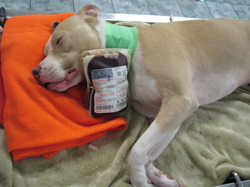
Ashton was screened as a blood donor and he will join our group saving lives. Ashton is the first of our pibbles that is a positive blood type.
| Pibbles to the Rescue |
|
Today Sarah, Cody, Salem and Tiggrrr went to the Blue Pearl to donate. Ashton was also along for screening. Sarah did really well with her donation and Petra gave her a mani/pedi.  Ashton was screened as a blood donor and he will join our group saving lives. Ashton is the first of our pibbles that is a positive blood type.
0 Comments
 Today Petey, Bailey and Toby donated blood at Blue Pearl. Petra trimmed his nails and cleaned Petey's ears (since he rolled in dirt before coming in for donation). As you can see Petey loves the Blue Pearl vamps and knows they take real good care of him. Bailey and Toby also got mani/pedi's but for some reason the camera age my pic of Toby and his donation. If your pet fits the criteria and you are interested in providing the gift of life to other families pets, please contact us at [email protected] and we will help you arrange for your first physical examination and initial screening tests (at no cost to you).
Immediately after donation, the body starts to replace the blood that was given. However, repeated blood donations over a relatively short period of time can lead to anemia, and should be avoided unless absolutely necessary. For this reason, after a donation is made, dogs and cats in this program only donate every two months.
SAVING LIVES !
also, with each donation given a credit will be applied to your account or donated to the charity of your choice. The accumulated credits can be applied toward emergency or specialty care your pet or a deserving rescue animal receiving care at BluePearl Veterinary Partners. If your donor pet ever requires a transfusion, the blood product will be provided at no charge. In addition, a physical examination will be performed at every donation and a full health screening including lab tests (valued at approximately $300.00 in blood tests done, which includes blood typing and comprehensive blood screening, with a copy for your records) will be run yearly, at no charge to you. To qualify as a donor, your pet must meet these requirements:
*Be between 1 and 8 years old *Dogs must weigh at least 50 lbs.; cats at least 10 lbs. *Be neutered or spayed, with no prior pregnancies. *No prior blood transfusions *Be current on vaccinations and heartworm preventative *Cats must live indoors only Donor animals should be checked by a veterinary surgeon that they are fit and healthy enough before making a blood donation, in which case the risks of donation are very small. Though few, the drawbacks of donating blood may include a slight swelling and bruising at the site where the blood was taken , which should fade over a few days. Also, if your pet is timid and afraid of doctor visits, it might be too stressful a favor to ask of her.
Giving blood will not hinder your pet’s normal activities, but you may want to let her rest easy that day. Pets recover after a donation as well as--if not more quickly --than people do. Access to plenty of water afterward, a good meal later in the day, and plenty of hugs and kisses is all they need!
In a quiet, calm area of the hospital, your pet lies down on a table covered in soft blankets while an assistant (or you) holds and talks with your pet while the unit of blood is collected. The actual process of donating blood is quite simple. It takes about 15-30 minutes and does not always require anesthesia. Most dogs do well with simple "paw holding", but high energy dogs and cats usually need some sedation, because kitties are far less likely to sit patiently for 15-20 minutes.
The area is usually clipped and cleaned and aseptically prepared before insertion of the needle. After preparing the area with a sterile scrub, blood is collected through a needle into a sterile collection set. Blood is taken from the jugular vein – the large vein that runs along the neck. A standard blood donation in the dog is 450ml (‘one canine unit’) and this can safely be obtained from a 25kg dog. |
Why DonateDonated blood saves pets' lives. For the same reasons sick or injured people often need blood transfusions that replace blood loss due to traumatic injury or surgery. Transfusions also are used to treat animals whose blood systems are not functioning well. Often, these are pets with diseases that attack their immune systems or diseases that prevent their blood from clotting normally--such as happens when pets and people suffer heat stroke. Other common situations when blood products (blood or plasma) may be used are with critically ill patients with cancer, anemia, clotting problems, internal parasites, heat stroke, or traumatic blood loss (auto accident, bite wounds) Archives
July 2016
Categories |